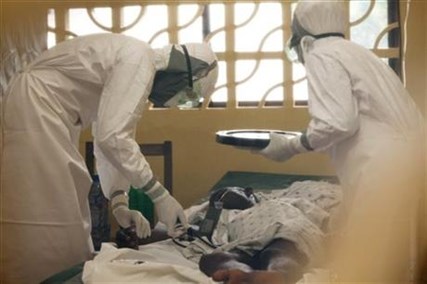
In this 2014 photo provided by the Samaritan's Purse aid organization, Dr. Kent Brantly, left, treats an Ebola patient at the Samaritan's Purse Ebola Case Management Center in Monrovia, Liberia. On Saturday, July 26, 2014, the North Carolina-based aid organization said Brantly tested positive for the disease and was being treated at a hospital in Monrovia.
Image Credit: AP Photo/Samaritan's Purse
July 27, 2014 - 4:26 PM
MONROVIA, Liberia - One of Liberia's most high-profile doctors has died of Ebola, a government official said Sunday, as an American doctor was treated in the West African country after contracting the disease, highlighting the risks facing health workers trying to combat the spread of the deadly virus.
Dr. Samuel Brisbane is the first Liberian doctor to die in an outbreak the World Health Organization says has killed 129 people in Liberia, and more than 670 in several West African countries. A Ugandan doctor working in the country died earlier this month.
The WHO says the outbreak, the largest ever recorded, has also killed 319 people in Guinea and 224 in Sierra Leone. As of July 23, the total number of cases in the three countries was 1,201, it said.
In Nigeria, officials announced on Friday that a Liberian official died of Ebola after flying from Monrovia to Lagos via Lome, Togo. The case underscored the difficulty of preventing Ebola victims from traveling given weak screening systems and the fact that the initial symptoms of the disease — including fever and sore throat — resemble many other illnesses.
Health workers are at serious risk of contracting the disease, which spreads through contact with bodily fluids.
Dr. Kent Brantly, an American helping respond to the outbreak in Liberia, is receiving intensive medical treatment there after he was infected with the deadly Ebola virus, a spokeswoman for aid organization Samaritan's Purse said. Brantly was in stable condition, talking with his doctors and working on his computer while receiving care, she said.
Earlier this year, Brantly was quoted in a posting about the dangers facing health workers trying to contain the disease.
"In past Ebola outbreaks, many of the casualties have been health care workers who contracted the disease through their work caring for infected individuals," he said.
Sierra Leone's top Ebola doctor also fell ill with the disease last week, though Chief Medical Officer Dr. Brima Kargbo said Sunday that he was "fairly stable and responding well to treatment."
The Liberian doctor, Brisbane, who once served as a medical adviser to former Liberian President Charles Taylor, was working as a consultant with the internal medicine unit at the country's largest hospital, the John F. Kennedy Memorial Medical Center in Monrovia.
After falling ill with Ebola, he was taken to a treatment center on the outskirts of the capital, where he died, said Tolbert Nyenswah, an assistant health minister.
Under the supervision of health workers, family members escorted the doctor's body to a burial location west of the city, Nyenswah said.
He added that another doctor who had been working in Liberia's central Bong County was also being treated for Ebola at the same center where Brisbane died.
The situation "is getting more and more scary," Nyenswah said.
News of Brisbane's death first began circulating on Saturday, a national holiday marking Liberia's independence in 1847.
President Ellen Johnson Sirleaf used her Independence Day address to discuss a new taskforce to combat Ebola. Information Minister Lewis Brown said the taskforce would go "from community to community, from village to village, from town to town" in order to increase awareness.
Meanwhile, the fact that a sick Liberian could board a flight to Nigeria raised new fears that other passengers could take the disease beyond Africa.
Nigeria's international airports were screening passengers arriving from foreign countries, and health officials were also working with ports and land borders to raise awareness of the disease. Togo's government also said it was on high alert.
Security analysts were skeptical about the usefulness of these measures, however.
"In Nigeria's case, the security set-up is currently bad, so I doubt it will help or have the minimum effectiveness they are hoping for," said Yan St. Pierre, CEO of the Berlin-based security consulting firm MOSECON.
An outbreak in Lagos, a megacity where many lived in cramped conditions, could be a major public health disaster.
There is no known cure for Ebola. The West Africa outbreak is believed to have begun as far back as January in southeast Guinea, though the first cases weren't confirmed until March.
Since then, officials have tried to contain the disease by isolating victims and educating populations on how to avoid transmission, though porous borders, satellite outbreaks and widespread distrust of health workers have made the outbreak difficult to bring under control.
In Sierra Leone, which has recorded the highest number of new cases in recent days, the first case originating in Freetown, the capital, came when a hairdresser named Saudata Koroma fell ill. She was forcibly removed from a government hospital by her family, sparking a frantic search that ended Friday. Kargbo, the chief medical officer, said Sunday that Koroma died while being transported to a treatment center in the east of the country.
__
Associated Press writers Clarence Roy-Macaulay in Freetown, Sierra Leone, and Heather Murdock in Lagos, Nigeria contributed reporting.
News from © The Associated Press, 2014